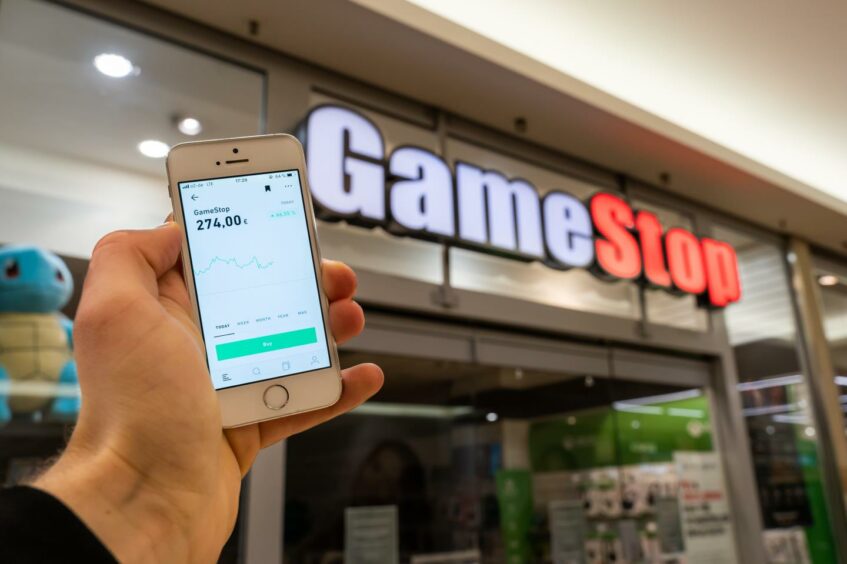This time last year the investing world was in a frenzy over GameStop.
For a brief time, shares in the struggling video game retailer soared.
Its market capitalisation – the total value of all its shares – was more than US$20 billion (£14.7 billion) – up from less than US$1bn (£735 million) only a few months before.
The company’s shares were so in demand that GameStop unseated Tesla as the year’s most searched-for stock.
GameStop is the most famous example of a “meme stock” – so called because tips are hyped up and shared on social media forums, particularly Reddit.
They’re powered by easy-to-use online trading platforms and even come with their own brand of slang, such as a YOLO (You Only Live Once) trade.
They also have a reputation for wild swings in share prices.
The market is still catching its breath but what can we all learn from the surge – and subsequent fall – in GameStop’s shares?
Yes, meme stocks are volatile, but they’re also evidence of a new generation of amateur investors challenging the accepted norms of financial services.
Why you need to stay flexible
The meme stock saga is a reminder why it’s a good idea to consider a flexible investing approach.
In the end, GameStop’s rise was short-lived. Its market capitalisation is now down to nearly one-third of what it was back in January 2021.
Its shares rose sharply and fell back just as quickly, and with higher levels of volatility there’s always the risk investors could lose out.
But examples like these have the potential to impact you even if you had no interest in speculating on a “risky” stock.
Here’s why
Many investors choose funds that track an index as a “hands-off” way to benefit from rises in the equity market.
But a sudden and meteoric rise from a meme stock – in GameStop’s case going from a small company to a large one practically overnight – can really skew the index.
While index providers catch up to recalibrate, investors can get stuck with the ups and downs of a more volatile stock.
In these circumstances, index investing can prove to be a fairly inflexible solution and end up harming your financial returns.
That’s why the funds we offer at AAB Wealth are actively managed, allowing us the option to buy or sell stocks if they no longer, in our view, meet the fund’s criteria.
Flexibility important in other markets
We also take our flexible approach into other asset classes.
Many investors look towards the bond market – fixed income – for returns that are lower risk and more stable than equities.
But even here, in recent times we’ve seen volatility in this market.
That’s why the funds we offer look to maintain flexibility. For example, the managers of the solutions we offer can change the fund’s term and credit allocation to match the evolving environment.
The value of financial advice
So, are there positives from this new era of investing?
We could be seeing the rise of a new generation of investors.
Robinhood, the online trading platform behind the surge in meme stocks, says its aim is to “democratise” finance.
That’s one of the reasons so many amateur investors have taken to it – they’re attracted to the idea that investing isn’t just the preserve of the incredibly wealthy.
Alongside this, we’re seeing evidence that investors are getting younger.
According to investment platform Hargreaves Lansdown, the average age of its users fell by seven years between 2012 and 2020.
Any evidence that people are considering how they save their money earlier in life is welcome news but this new environment isn’t for everyone.
Someone with decades to go until they retire won’t have the same attitude to risk as someone who’s only a few years away, and protecting a six-figure sum.
Are your investments ending up in the doghouse?
Social media giants face calls to refund public for online scams
Whatever stage you’re at, you can benefit from a financial planner to guide you through the process.
They can talk you through the risks involved and advise you on the potential impact your decisions could have for the long term.
Martyn Paterson is a chartered financial Planner at Aberdeen-based AAB Wealth.


